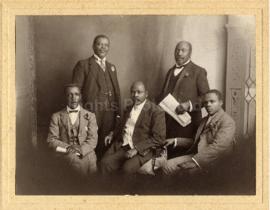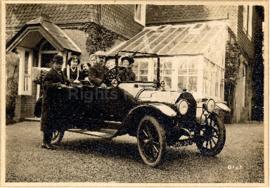Área de identidad
Código de referencia
Título
Fecha(s)
- 1914 - 1916 (Creación)
Nivel de descripción
Fondo
Volumen y soporte
5 photographs
Área de contexto
Nombre del productor
Historia biográfica
Sol. T. Plaatje was born on the farm Doornfontein in the Boshof district on October 9 1876. He was educated at Pniel at the mission school established by the Berlin Missionary Society, from 1884 to 1890. In 1894 he worked as a postman in Kimberley, while studying for the Cape Civil Service Certificate. He moved to Mafeking where he became a court interpreter and magistrate's clerk, having at his command a knowledge of about ten languages. He rendered valuable service as an interpreter to the British during the South African War.
In 1901, backed financially by Chief Silas Molema, he begun editing the Koranta ea Becoana, the first Tswana-English weekly newspaper. In 1910 he moved to Kimberley where he edited the Tsala ea Becoana which changed its name to Tsala ea Batho in 1912. The newspaper ceased publication in 1915 because of Plaatje's presence in Britain.
Plaatje was not only an interpreter, journalist and an author but also a politician. When the South African Native National Congress was formed in 1912, Plaatje became General Corresponding Secretary. When the question of native land arose in 1913 Plaatje became a member of the delegation which went to Britain in 1914 to petition the British government. Despite the outbreak of World War I, which prevented the delegation from achieving its mission, Plaatje remained in England. During this time he wrote Native life in South Africa, before and since the European war and the Boer rebellion (London,1916), arguing the cause of the deputation and the land issue. Returning to Kimberley, he then established The Diamond Fields Men's Own Brotherhood, a body which propagated racial harmony. He returned to Europe in 1919 heading the African National Congress delegation, which attempted to get the Native Land Act discussed at the Peace Conference at Versailles. Subsequently he visited the United States and Canada in 1921.
Plaatje wrote extensively, contributing articles to English and Black newspapers, as well as producing literary works such as Mhudi: an epic of South African native life a hundred years ago (Lovedale,1930), as well as translating some of Shakespeare's works, The Comedy of Errors and Julius Caesar, into Tswana.
In 1898 he married Elizabeth Mbelle, the sister of I Bud Mbelle, an important court interpreter and one time general secretary of the African National Congress. They had four sons, St Leger, Richard, Halley and Johann Gutenberg, and two daughters, Olive and Violet. Plaatje died on June 19 1932, while on a visit to Johannesburg and was buried at Kimberley.
Institución archivística
Historia archivística
Origen del ingreso o transferencia
Área de contenido y estructura
Alcance y contenido
5 Photographs including the deputation of the South African Native National Congress (SANNC) to England in 1914; Sol Plaatje in England and Canada in 1921; and two unidentified and undated groups including Sol Plaatje.
Valorización, destrucción y programación
Acumulaciones
Sistema de arreglo
Área de condiciones de acceso y uso
Condiciones de acceso
Condiciones
Permission to publish has to be obtained from Historical Papers.



